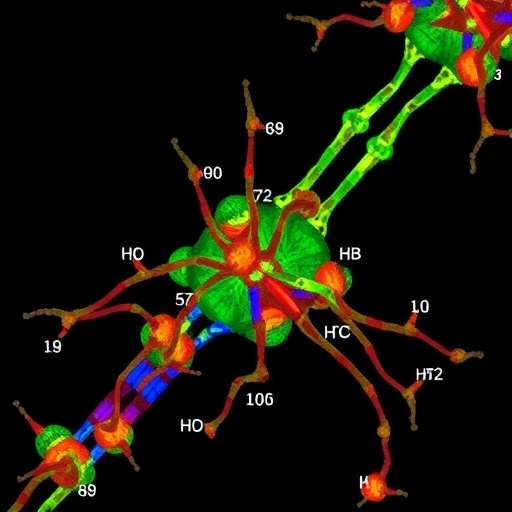In a groundbreaking study poised to reshape our understanding of neurodegenerative diseases, researchers Dubey and Bellen have unveiled a compelling neuroprotective role of polyunsaturated fatty acids (PUFAs) in C9orf72-linked amyotrophic lateral sclerosis (ALS) and frontotemporal dementia (FTD). Published in the prestigious journal Nature Neuroscience, this work delves deeply into the mechanisms by which PUFAs could mitigate the cellular and molecular pathologies characteristic of these devastating disorders. Given the intricate and multifactorial nature of ALS/FTD, these findings represent a significant stride toward potential therapeutic interventions targeting lipid metabolism and membrane biology.
The study adopted a multifaceted methodology involving advanced lipidomics, cellular models derived from patient-induced pluripotent stem cells (iPSCs), and in vivo animal models harboring C9orf72 expansions. Through comprehensive lipid profiling, the researchers identified a significant alteration in the composition and metabolism of PUFAs in affected neurons compared with controls. Notably, there was a depletion of omega-3 and omega-6 fatty acids, implicating these molecules in the vulnerability of neurons to C9orf72-associated stress.
Further mechanistic exploration revealed that supplementation with specific PUFAs restored membrane integrity and reduced endoplasmic reticulum stress markers, which are known contributors to neurodegeneration. The restoration of membrane homeostasis appeared to ameliorate dysfunctional autophagy—a key cellular clearance process impaired in C9orf72 ALS/FTD—and decrease the accumulation of cytotoxic aggregates. These findings highlight the multifactorial benefits of PUFAs, extending beyond structural support to modulating critical cellular stress responses.
Intriguingly, the study also demonstrated that PUFAs influenced mitochondrial dynamics and bioenergetics in affected neurons. Given that mitochondrial dysfunction is a hallmark of ALS/FTD pathophysiology, this aspect underscores a broader systemic effect of lipid metabolism on neuronal survival. Treatment with PUFAs improved mitochondrial membrane potential and reduced reactive oxygen species production, thereby attenuating oxidative stress-induced cellular damage.
Neuropathological examination of C9orf72 animal models treated with PUFA-enriched diets corroborated the cellular findings. These animals exhibited delayed disease onset, improved motor function, and extended survival compared with untreated controls. The authors postulate that the neuroprotective effects arise from an integrated modulation of membrane composition, signaling cascades, and metabolic homeostasis, collectively contributing to resilience against the neurodegenerative cascade initiated by C9orf72 pathology.
The implications of this research transcend the immediate scope of C9orf72-linked ALS/FTD. The intersection between lipid biology and neurodegeneration could illuminate novel targets for a spectrum of disorders, including Alzheimer’s disease and Parkinson’s disease, where altered lipid metabolism is increasingly recognized as a contributor to pathogenesis. Dubey and Bellen’s work thereby opens a new frontier in neurotherapeutics centered on precision modulation of lipid profiles.
While the neuroprotective potential of PUFAs is promising, the study’s authors acknowledge that translation to clinical practice necessitates cautious optimization. Dosage, bioavailability, and timing of PUFA administration remain critical parameters to elucidate in human trials. Furthermore, the complexity of lipid metabolism networks mandates comprehensive systems-level analyses to predict and monitor therapeutic responses effectively.
Nevertheless, this study represents a paradigm shift toward integrative neurobiology, marrying genetic insights with metabolic regulation to confront the challenge of neurodegeneration. The burgeoning field of lipidomics stands to benefit profoundly from these findings, as researchers seek biomarkers indicative of disease progression and response to intervention, potentially yielding non-invasive diagnostic tools.
Moreover, the research sparks intriguing questions regarding dietary influence and lifestyle factors in modulating disease penetrance and progression in genetic ALS/FTD. The role of nutrition in neurodegenerative disease has long been debated, but Dubey and Bellen’s data provide a mechanistic foundation for considering specific fatty acid supplementation as part of a multifaceted therapeutic regimen.
Technological advances leveraged in this study, including state-of-the-art mass spectrometry for lipid profiling and CRISPR-based models, illustrate the power of modern biomedical tools in unraveling complex disease networks. The precise quantification of PUFA species and their spatial distribution within neurons enables a granular understanding of how these molecules interface with neurodegenerative processes at the molecular level.
In sum, Dubey and Bellen’s research spotlights polyunsaturated fatty acids as potent modulators of neuronal health in the context of C9orf72-associated ALS and FTD. The multifaceted mechanisms by which PUFAs exert neuroprotection underscore the potential for developing lipid-targeted therapeutics capable of altering disease trajectories. As the neuroscience community digests the profound implications of these findings, the prospect of harnessing dietary and pharmacologic interventions to combat incurable neurodegenerative diseases becomes increasingly tangible.
Future research directions inspired by this study will undoubtedly focus on delineating optimal PUFA species and formulations, exploring synergistic effects with other neuroprotective agents, and expanding investigations to broader patient cohorts. The integration of cutting-edge lipidomics with genetic and proteomic data promises a comprehensive framework for understanding and ultimately mitigating neurodegeneration.
As the global burden of ALS and FTD continues to rise, innovations such as this provide much-needed hope. The convergence of lipid biology and neurodegeneration heralds a new era of therapeutic discovery, spearheaded by insightful research that blends molecular detail with translational ambition. The full impact of Dubey and Bellen’s work will unfold in the years to come, potentially transforming the clinical landscape of these formidable diseases.
Subject of Research: Neuroprotective effects of polyunsaturated fatty acids in C9orf72-linked amyotrophic lateral sclerosis and frontotemporal dementia.
Article Title: A neuroprotective role of polyunsaturated fatty acids in C9orf72-ALS/FTD.
Article References:
Dubey, S.K., Bellen, H.J. A neuroprotective role of polyunsaturated fatty acids in C9orf72-ALS/FTD. Nat Neurosci 28, 710–712 (2025). https://doi.org/10.1038/s41593-025-01920-7
Image Credits: AI Generated
Tags: ALS and FTD genetic overlapsC9orf72 ALS therapeutic interventionsdipeptide repeat proteins in ALSfrontotemporal dementia mechanismshexanucleotide repeat expansions impactlipid metabolism and membrane biologyneurodegenerative diseases researchneuronal dysfunction and deathneuroprotective roles of lipidspolyunsaturated fatty acids in neuroprotectionpotential treatments for ALS and FTDRNA foci in neurodegeneration





